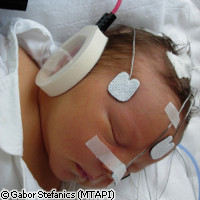Baby's got rhythm: research shows that beat perception is innate
Newborn babies are capable of detecting the beat of rhythmic sound sequences, researchers in Hungary and the Netherlands have shown. Their findings, published in the journal PNAS (the Proceedings of the National Academy of Sciences), are an outcome of the EU-funded EMCAP ('Emergent cognition through active perception') project, which is funded with EUR 1.95 million under the Sixth Framework Programme (FP6). Rhythm perception is an essential component of human communication. It helps people find the right time to reply or interject in a conversation, without which understanding and cooperation can break down. Music provides an excellent domain for exploring this phenomenon, as it is universal (like language) and follows a clear structure. Until now, little was known about how newborn infants process rhythm. Past studies have shown that babies begin to perceive a 'beat' in music during the first seven months of life, and this has largely been attributed to being rocked to music by their carer. But there has been considerable debate as to whether this ability is innate or learned. In the present study, the researchers studied two- and three-day-old sleeping infants, accompanied by their mothers, by attaching electrodes to their heads and playing rhythmic sequences to them through (very comfortable-looking) headphones. The sequences, which comprised basic rock beats played on a snare, bass, and hi-hat, were played to the infants hundreds of times and their electrical brain responses were recorded. Periodically (about 10% of the time), the downbeat would be omitted from a part of the sequence. When this happened, the babies noticed; their brains reacted to it as an unexpected event. The reactions of the newborns to the omission of a downbeat were similar to reactions seen in a control group of 14 adults who listened to the same sequences. 'In adults,' the researchers explain, 'infrequently violating some regular feature of a sound sequence evokes a discriminative brain response called 'mismatch negativity' In previous studies of newborns, similar reactions were seen in response to a harmonic tone being introduced to a background of noise. Beat detection involves detecting a full rhythmic cycle and indentifying where it starts. The newborns showed that they could identify this start position, as they had no special reaction to omissions of sounds in other, less relevant parts of the sound cycle. 'So it appears that the capability of detecting beat in rhythmic sound sequences is already functional at birth,' the authors conclude. 'Our results show that although learning by movement is probably important, the newborn auditory system is apparently sensitive to periodicities and develops expectations about when a new cycle should start.' The findings raise important questions about learning and about the origins of music. The sensitivity of newborns to important musical features, the authors speculate, could mean that music carries some evolutionary advantage. Further studies, the authors say, are needed to clarify whether neonates can not only recognise a beat, but build a hierarchically ordered representation of meter. EmCAP, which comprised perceptual experiments and computational modelling studies in music cognition, was completed in September 2008. Its goal was to investigate complex cognitive behaviour in artificial systems.
Countries
Hungary, Netherlands



